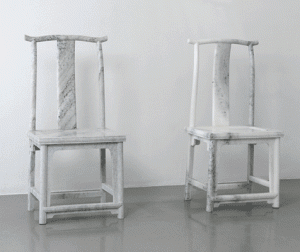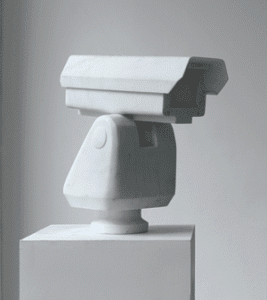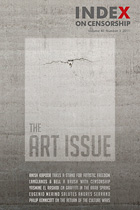27 Apr 2012 | Asia and Pacific, Index Index, minipost
On 24 April, Chinese petitioner Hu Lianyou was sentenced to two years in prison for defamation after comments made about a local police chief online, according to Chinese state media. Hu allegedly wrote posts on popular websites accusing two officers, including police chief Zheng Hang, of corruption and beating him during an interrogation. The petitioner requested that the trial take place in a more neutral court, rather than in his native Dong’an county, where he has a history of criticising authorities. His request was denied, according to the Chinese Media Project.
26 Apr 2012 | Asia and Pacific
The artist Ai Weiwei’s outspoken views are gaining currency. Simon Kirby reflects on a change of mood in China as people lose faith in the Party
In June 2011, Ai Weiwei was released from detention to a form of home surveillance. He is confined to the city of Beijing and must inform the authorities of his movements. He may not make public statements nor comment on his detention and the terms of his release (a condition he has already breached); further investigations are pending and a prosecution may be pursued within a year. It is still far from clear what the implications are for Ai as a private individual, let alone for his capacity to continue to work as an artist. Just as he was never formally arrested neither has he been fully freed.
 This shabby story takes place against a backdrop of heightened political sensitivity in China as the country braces itself for transition to a new, as yet unannounced, group of top leaders. This is scheduled to take place next year in the Great Hall of the People during the 18th National Congress of the Communist Party. The Congress will certainly be a rigid spectacle of national purpose and will make numbing television viewing. Not least because it will be impossible not to speculate on the nature of the Byzantine succession struggle which is currently taking place behind firmly locked doors.
This shabby story takes place against a backdrop of heightened political sensitivity in China as the country braces itself for transition to a new, as yet unannounced, group of top leaders. This is scheduled to take place next year in the Great Hall of the People during the 18th National Congress of the Communist Party. The Congress will certainly be a rigid spectacle of national purpose and will make numbing television viewing. Not least because it will be impossible not to speculate on the nature of the Byzantine succession struggle which is currently taking place behind firmly locked doors.
The detention of Ai Weiwei was based on intimidation rather than legal process — a pattern that is well established in China. In effect, he was kidnapped by the state and never informed which organ of the machinery was holding him, nor was he charged with a specific crime. Rather, his indictment was based on “confessions”. Even his release was justified on the spurious grounds of cooperative behaviour, willingness to make amends and poor physical health. As the threat of re-opening the case against him still looms, he is now being blackmailed into falling into line.
A few weeks after Ai Weiwei was released I had lunch with him. He talked frankly about the contradictions of his detention and the absurdity of his current position. He clearly intends to continue working and his remarkable personal charisma is undimmed. Yet he is, in my view, a person who is also deeply disturbed by what is happening to him.
Artists and the “Tiananmen contract”
Throughout the 90s, Chinese state-controlled capitalism ushered in a remarkable economic boom from which the fledgling contemporary art scene benefited. Artists, as potentially problematic figures, were heavily co-opted with a variety of sticks and carrots — there were rich rewards to be had and the freedom to continue making, exhibiting and travelling was granted to artists in exchange for creating non-critical work. In many cases, artists were understandably tempted to comply. Ever since the fearful events of the Tiananmen massacre on 4 June 1989, there has been an enforced accommodation between the government and society. I dubbed this the “Tiananmen contract” in an article for Index on Censorship that was published in 2008, ahead of the Chinese Olympics. The deal is that the Communist Party would steer the people towards individual prosperity and the country to greatness, through ensuring stability. In return, the primacy of the Party could never be questioned. Three years ago, the contract was widely supported — the level of basic freedom was greater than it had been in 20 years and living standards were rising. There was also pride at China’s leading role on the world stage. Today, I believe this consensus is much more fragile.
 The daily reality for Chinese citizens is that living costs are rising fast and incomes are not keeping up. Working conditions for white collar workers can be demoralising, while those for migrant manual workers, who continue to have even basic rights denied them, are often shockingly exploitative. Commuting in the new, high-rise cities can be exhausting and alienating. People are deeply sceptical about the capacity of the state to protect them from (often deliberately) contaminated food and a toxic living environment, criminal scams, corruption in the medical profession and corporate exploitation of consumers. The Party is widely understood to be at the centre of many of these scandals and is often seen to be protecting wrongdoers. Most flagrantly, the new super-rich live effectively beyond the reach of the law, while ordinary people can in no way count on basic social justice for themselves and their families.
The daily reality for Chinese citizens is that living costs are rising fast and incomes are not keeping up. Working conditions for white collar workers can be demoralising, while those for migrant manual workers, who continue to have even basic rights denied them, are often shockingly exploitative. Commuting in the new, high-rise cities can be exhausting and alienating. People are deeply sceptical about the capacity of the state to protect them from (often deliberately) contaminated food and a toxic living environment, criminal scams, corruption in the medical profession and corporate exploitation of consumers. The Party is widely understood to be at the centre of many of these scandals and is often seen to be protecting wrongdoers. Most flagrantly, the new super-rich live effectively beyond the reach of the law, while ordinary people can in no way count on basic social justice for themselves and their families.
There are attempts to address these problems through draconian anticorruption campaigns which make examples of officials accused of vice and graft. There are also strenuous efforts to reform social and fiscal legislation and to professionalise the legal system. This year’s 90th anniversary celebrations of the founding of the Chinese Communist Party saw an outpouring of congratulatory media stories featuring joyful ethnic minorities, good comrades and citizens and glorious historical deeds. Meanwhile Tiananmen Square, which is the heart of the great people’s revolution, was firmly sealed and off limits.
In March, I had dinner in a noisy Korean barbecue restaurant in Beijing with a favourite Chinese artist. Only 32 years old, he already enjoys a successful international career, is profoundly patriotic and the holder of an important teaching post. During the evening, my friend passionately expounded an opinion in full earshot of fellow diners and waiting staff that would have made me extremely uncomfortable even five years ago. Namely, that the Chinese Communist Party in 2011 is more fundamentally corrupt than even Chiang Kai-shek’s Kuomintang (KMT or Nationalist Party) of the 40s. The official history, tirelessly propagated in films and TV dramas, is that that the nationalist administration had degenerated into a kind of murderous gangsterism before the 1949 revolution. Yet my artist friend argued that pre-revolutionary society in many ways remained, for all its faults, a pluralistic one: an imperfect democracy. There was at least formal acknowledgment of the independence of the judiciary and channels to seek redress from injustice. The Communist Party of the 21st century, on the other hand, retains its monopoly on power through intimidation and force. It is deeply complicit in land grabs, forced evictions, endemic bribery and corruption. It even facilitates the enrichment of favoured businesses through official contracts and privileged access to resources and markets.
A new trend for speaking out
The legal system today, my friend told me, is explicitly in place in order to serve the interests of the Party above anything else. Citizens who attempt to petition the government to redress flagrant social wrongs can expect to be met at best with official obstruction. In many documented cases they will encounter thuggish intimidation and violence. This viewpoint is not unusual. In a way that is entirely characteristic of China, I then went on to hear the same, previously unimaginable, opinion expressed by three other, unrelated people within the course of as many weeks. If during the course of conversation with people in China, one digs just a little, it’s possible to encounter a profound and worrying cynicism in the integrity of the Chinese state.
 It seems that suddenly these views are being expressed loudly and in public. Ai Weiwei, on the other hand, has been consistently and persistently making his views known. His father, Ai Qing, was one of China’s most eminent poets, but was a political prisoner for 16 years in the western desert region of Xinjiang. This is where Ai Weiwei spent his entire childhood and early adolescence. When Ai Weiwei returned to China in 1993 after ten years in the United States, his rehabilitated father advised him on his responsibility as a Chinese citizen to speak out, reportedly saying, “You are at home here, there’s no need to be polite.”
It seems that suddenly these views are being expressed loudly and in public. Ai Weiwei, on the other hand, has been consistently and persistently making his views known. His father, Ai Qing, was one of China’s most eminent poets, but was a political prisoner for 16 years in the western desert region of Xinjiang. This is where Ai Weiwei spent his entire childhood and early adolescence. When Ai Weiwei returned to China in 1993 after ten years in the United States, his rehabilitated father advised him on his responsibility as a Chinese citizen to speak out, reportedly saying, “You are at home here, there’s no need to be polite.”
An intriguingly enigmatic artist, Ai Weiwei’s public personality is also complex and elusive. The true Ai Weiwei may well be a nuanced combination of the many faults of which his detractors accuse him. However, it has also now become clear, even to his harshest critics, that this artist has courageously maintained a highly principled position for which he is now paying a heavy price. It is my observation that many others are beginning to come round to his point of view.
This article appears in the “Art Issue” of Index on Censorship. Click on here for subscription options and more.
Simon Kirby is the director of Chambers Fine Art in Beijing
This issue is nominated for an Amnesty Award
16 Apr 2012 | Uncategorized
A form of censorship has “entered the Chinese soul”, dissident author Ma Jian told Index at the London Book Fair today, arguing that a fear of freedom and human rights is instilled in the country.
Following a press conference held by the Independent Chinese PEN Centre (ICPC) to highlight the exclusion of dissident and independent writers from the China-focused section of the event, Ma said self-censorship among domestic authors is a “wide-scale threat” and a “disease” that is “almost part of the Chinese psyche”.
The three-day book fair held in London’s Earls Court is being attended by over 180 Chinese publishers and will feature 21 authors from the People’s Republic, in partnership with the British Council. Yet the Council has received criticism for collaborating with the country’s General Administration of Press and Publications (GAPP), the agency that regulates printed media, by only inviting authors sanctioned by the body. Index was among the signatories of a letter to the Guardian last week raising the issue:
It is bad enough that writers, journalists, bloggers and academics are subject to heavy censorship in China, but we should not be allowing the authorities to replicate their restrictions on freedom of expression further afield.
ICPC president Tienchi Liao said it was “unacceptable” that the British Council chose to collaborate with GAPP while many of her colleagues were imprisoned.
“The event is supposed to promote cultural exchange but it co-operates with the perpetrators,” Liao told Index.
Speaking to Index after the conference, Ma said he was “saddened” that China was invited to the fair as guest of honour, given its reputation for detaining and imprisoning authors who discuss taboo or sensitive issues, and censoring related content in print, broadcast and online.
“Dialogue is necessary but it must be open and free and encompass different voices,” he said. “The Chinese government has brought heads on a platter but where are the arms and legs?”
Ma, who lives in London and was banned from re-entering China in 2011, said the fair and other cultural events should “lead by example” and invite independent authors alongside those sanctioned by GAPP.
“The British Council should have been braver and push the limits,” he said, suggesting they ask Liu Xia, the wife of imprisoned Nobel peach prizer winner and dissident author Liu Xiaobo, who has been under house arrest since late 2010, to attend.
When asked if a certain amount of appeasement was to be expected as the West attempts to foster improved diplomatic relations with China, Ma said he was not an advocate of a total boycott of the event. “I advocate engagement but it mustn’t compromise freedom of speech and human rights,” he said.
“Is there an alternative? Maybe not,” Tienchi Liao said. “But the planning could be more strategic. The British Council could invite authors who aren’t ‘official ones’ — Yan Lianke, or Su Tong — who aren’t state-approved but are not forbidden either.”
“If that had happened we wouldn’t be so outraged,” she added.
In a letter to the Guardian today, London Book Fair director Alistair Burtenshaw and literature director of the British Council, Susie Nicklin, said the programme of authors invited were diverse, with the programme representing a “great opportunity to deepen understanding and strengthen cultural and business links between the UK and China.”
Any international institution working with books in China needs to liaise with the General Administration of Press and Publication,” the pair wrote. “The selection of writers for the cultural programme at London Book Fair 2012 was undertaken by the British Council in wide consultation with its official partners, industry professionals, and experts in the field both in China and the UK.
The Chinese literary figures attending include novelist Mo Yan and 2010 Man Asian literary prize winner Bi Feiyu.
Marta Cooper is an editorial assistant at Index. She tweets at @martaruco.




